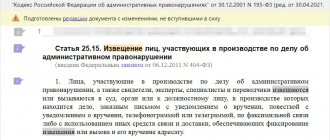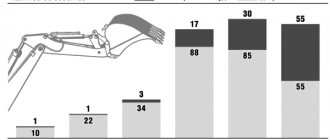The legislation of the Russian Federation does not directly indicate liability for knowingly false reporting of an administrative offense. However, you should not delude yourself - this may result in both administrative and criminal liability. The fact is that these actions can be interpreted in two ways. If you are accused of knowingly false denunciation, and not just reporting, then such an offense is no longer administrative, but criminal. The liability for it is quite strict. You can get not only a fine, but also a real prison sentence.
If you have already been accused of deliberately false reporting or denunciation, in such a situation you do not need to refuse the help of a good lawyer. It is unlikely that you will be able to solve this problem on your own. There is no need to run through dubious sites in search of a lawyer who can help you with an administrative violation. Contact a trusted, competent professional.
What qualifies as a knowingly false report?
Let's imagine the situation. Ivan Vasilyevich decided to take revenge on his neighbor Nikolai for his delayed repairs, which prevent the pensioner from sleeping after lunch. Ivan Vasilyevich thought and decided to call the police. He wants to accuse Nikolai of the fact that his neighbor is allegedly engaged in the illegal sale of plants containing psychotropic substances.
Ivan Vasilyevich decided to motivate his denunciation by the fact that different people often come to the man’s home. To tell the truth, there are no drug addicts there; his colleagues and customers come to Nikolai. The fact is that he is a networker and sells household chemicals.
Let's consider whether such a call to the authorities with accusations against Nikolai will be fraught with something for Ivan Vasilyevich. Or perhaps he will go unpunished for this administrative offense?
So, having made a decision, Ivan Vasilyevich calls 02. Or the district police officer, which, in principle, is the same thing. He is not hiding, he reports his information. The pensioner thinks that nothing will happen to him for this. Is it so?
Liability for false reporting
No. The fact is that Ivan Vasilyevich’s actions can be assessed in two ways. In any case, liability is provided for offenses involving knowingly false reports, but it can be administrative, or it can also be criminal.
If they consider that Ivan Vasilyevich simply misinformed the special services (in our case, this is the police, and maybe also the ambulance, the Ministry of Emergency Situations, etc.), then he will face liability under Art. 19.13 Code of Administrative Offenses of the Russian Federation. In this case, the person is brought to administrative responsibility, and for this offense he will be given a fine in the amount of 1,000 to 1,500 rubles. Also, such an act can be qualified as testimony of a witness. In this case, the consequence of an administrative offense will be liability under Art. 17.9 Code of Administrative Offenses of the Russian Federation. As a punishment, a fine will be imposed in the same amount as under Art. 19.13 Code of Administrative Offenses of the Russian Federation.
In addition, the pensioner may be required to recover losses caused by his action. For example, the cost of gasoline spent by a police car to arrive on call.
False denunciation
It could turn out completely differently if the police regard Ivan Vasilyevich’s actions as a denunciation. This will happen if the pensioner accuses Nikolai not only of distributing illegal plants, but also of organizing a drug den. In this case, Ivan Vasilyevich may face not only a fine of up to 300,000 rubles, but also compulsory, corrective or forced labor for up to 5 years. In addition, Article 306 of the Criminal Code of the Russian Federation provides for imprisonment for up to 6 years.
When carrying out a fictitious denunciation, the guilty person harms not only the one against whom he speaks. The attacker thereby forces law enforcement officers to do extra work, wasting time, effort and money from the state. Article 306 of the Criminal Code of the Russian Federation is invoked if the statement of denunciation contains information not only about an administrative, but also about a criminal offense.
As you can see, liability for knowingly false reporting may vary. It makes no difference how the person reported the administrative offense. He could do this in writing, by telephone, or during a visit to law enforcement agencies. The pensioner will be held accountable in any of these cases. The main thing is that the message was deliberately false, i.e. not true. And because of him, response measures were taken by employees of specialized services.
In this case, the intentional nature of the administrative offense must be revealed. That is, the person making a fictitious statement must understand that he wants to deceive law enforcement agencies and slander another person.
If a person made an incorrect statement without realizing it, then it is not his fault, which means he will not be held accountable. This can happen if the applicant himself was misled by someone, received false information about an offense, etc.
Sources:
Knowingly false testimony of a witness, explanation of a specialist, expert opinion or deliberately incorrect translation
Deliberately false call to specialized services
Deliberately false denunciation
False testimony in civil law
According to Art. 70 of the Code of Civil Procedure of the Russian Federation, a witness in civil proceedings is also obliged to give only truthful testimony, otherwise liability may be applied under Art. 307 of the Criminal Code of the Russian Federation. At the same time, it is in civil proceedings that a witness is extremely rarely liable before the law for giving knowingly false testimony; such cases are isolated. This is partly explained by the fact that many civil law norms already contain possible consequences in the event of deception by one of the parties to the contract (failure to provide truthful information about the product, concealment of the expiration date, silence about the fact that the subject of the contract is pledged to third parties, etc. ).
Thus, in civil law, one of the parties to a contract communicates false information about the subject of the transaction. If such a fact is established, in accordance with Art. 179 of the Civil Code of the Russian Federation, any transaction is subject to cancellation as invalid; the claim of the injured party in such cases is always satisfied.
Example No. 7 . Kulikov E.N. applied to the court to invalidate the purchase and sale transaction of an apartment that he wanted to purchase from an acquaintance D.L. Pytalov. After Kulikov E.N. gave the money to the seller, the contract was transferred to Rosreestr for registration of rights, which was not done. The reason for the refusal to register was that the apartment was secured by a credit institution, which Pytalov did not inform Kulikov about when drawing up the contract, although he was aware of it. At the court hearing in the civil case, Pytalov confessed that he actually knew that the apartment was listed as collateral for another obligation, but hoped that he would reissue the loan and remove the apartment from the status of collateral while the documents were being considered Rosreestrom. The claim of the injured party was satisfied, and the transaction was declared invalid.
Civil legislation separately provides for the rules for terminating insurance contracts. Thus, Article 944 of the Civil Code of the Russian Federation states that the policyholder is obliged to provide information about himself that is important for determining the period of the possible occurrence of an insured event. In other words, if the policyholder is silent about a certain circumstance that would affect the terms of the contract, or provides false information, the insurance payment may not be made at all.
Most often, citizens enter into liability insurance contracts for credit obligations. So, if, when concluding such an agreement, a citizen does not disclose (which is also considered fraud) information about his serious illness, then when an insured event occurs (for example, the death of the borrower), the insurance company will sue, proving the deliberate failure to disclose important information to it. If it is reliably established that the person suffering from the disease concealed his diagnosis, the court will be on the side of the insurer.
Example No. 8 . Zherdin N.G. I bought furniture for my apartment on credit, and the obligation was subject to compulsory insurance (as often happens now). When concluding the contract, Zherdin did not inform the policyholder of his diagnosis, which he had been given for several years - systemic lupus, a disease of the immune system, due to which death can occur at any time. When Zherdin N.G. died, the cause of death was established - the diagnosis was made, the disease progressed rapidly. Since the illness was not reported on time, in court the representative of the insurance company easily obtained termination of the contract; the insurance premium was not paid.
Types of offenses and liability for them
Offenses related to reporting false information to law enforcement agencies can be divided into two groups:
- false reports of offenses intentionally sent to law enforcement agencies by telephone, through a written application or in electronic form, through the department’s website;
- false testimony presented to the court and law enforcement agencies in the framework of civil, criminal or administrative proceedings or legal proceedings by persons having procedural status.
Note!
Depending on the type of proceedings in which such false information is reported, as well as the circumstances of the situation, the offender faces administrative or criminal liability.
Perjury and related crimes
Perjury is information given by a person during an investigation or consideration of an administrative case in court.
It may entail certain consequences. Such consequences may affect other participants in the process or other citizens. There are criminal penalties for such crimes, including for false denunciation.
When the consequences occur, we can already talk about related crimes, their totality. Punishments within the limits of the law must occur for each of them. The court assigns the type and duration of punishment within the framework of its powers, as well as the rules of law (for the totality of crimes).
Giving false testimony
Only intentional acts are unlawful, that is, the presentation of incorrect evidence due to forgetfulness, illness or as a result of an honest mistake is not qualified under Article 307 of the Criminal Code of the Russian Federation or Article 17.9 of the Administrative Code
The subject of the crime can be a witness, expert or translator.
These are persons over 16 years of age who are not recognized as victims in the case under consideration.
At the same time, they must not only tell the truth, but also not conceal known facts.
If such participants in the process openly declare their unwillingness to testify, liability may arise under Article 308 of the Criminal Code of the Russian Federation.
False witness testimony can either exonerate or incriminate, deny or distort facts.
Persons charged with providing information are informed of the liability for giving false testimony.
In confirmation of this, a signature is placed on documents confirming certificates, translations and expert assessments with a warning note.
When there is no responsibility
1. Conscious delusion. We have noted previously that the primary basis for legal prosecution for perjury is the establishment of guilt. Therefore, if a person was in good faith mistaken about any of the facts that he reported, there will be no crime in his actions.
Example No. 10 . In the case of P.R. Lebedev, accused of insult, witness K.A. Motin, who was present during the conflict between the victim and the defendant, was interrogated. Motin explained to the court that he had not heard any offensive phrases from P.R. Lebedev. Due to the fact that two other persons present in the same place gave different testimony (they heard insults pronounced quite loudly), in relation to Motin K.A. a criminal case was initiated for giving knowingly false explanations under Art. 307 of the Criminal Code of the Russian Federation. Contrary to the prosecution's arguments, Motin K.A. was acquitted, while the court indicated that Motin K.A. explained the contradictions by saying that he was not attentive enough to what was happening between Lebedev P.R. and the victims, because at that time he received a phone call and he turned all his attention to the telephone conversation. Thus, a conscientious error of the witness Motin K.A. was established, which excludes criminal liability for his explanations that do not correspond to reality.
2. A special condition, the fulfillment of which guarantees the release from liability of the victim, witness, translator, expert, specialist. This condition is contained in the note to Article 307 of the Criminal Code of the Russian Federation: if, before the verdict (decision) of the court, the listed persons confess to the falsity of their testimony (conclusion, translation), there can be no criminal prosecution.
Example No. 11 . Kolosov A.M. caused bodily harm to his child, witness A.R. Mironov, who was a friend of the defendant, testified in the case. Mironov A.R. said at the trial that he never knew that Kolosov A.M. Raises the child strictly and with beatings. After interrogation of Mironov A.R. The trial had not yet been completed; it was planned to study the case materials and interrogate other persons. At one of the subsequent court hearings Mironov A.R. came again and explained that earlier he deliberately did not voice Lebedev’s cruel methods of raising his son. He also said that while at home, he thought about the situation for a long time and decided to tell the truth. According to the note to the article, Mironov cannot become an accused in the case of giving deliberately false testimony, since he confessed to everything earlier than the final decision in the case.
3. Lies as a way to evade responsibility. A line of defense built on distortion of circumstances in favor of the defendant cannot be a criminal offense. This rule is enshrined in Article 51 of the Constitution of the Russian Federation, which the investigator is obliged to explain to each accused. This provision states that no one is obliged to testify against himself. This rule, in essence, provides the opportunity for defendants, suspects, and accused to legally lie to the investigation and the court.
Judicial practice based on false testimony
False testimony in court occurs in different situations.
There are precedents for deliberate deception of the investigation and the court “by order” of any of the parties , in order to delay the investigation, due to different understandings of the situation and circumstances.
There is even self-incrimination to protect against accusations from loved ones. The courts take all this into account in their practice.
Despite the rarity of the application of administrative liability for such cases, there are examples. Thus, in January 2013, materials based on the results of a judicial review of the witness’s testimony were sent to the prosecutor’s office of the Oktyabrsky district of Barnaul.
He claimed that his acquaintance, accused of drunk driving, was not driving the car, but was only waiting for him after a phone call. However, the details of the negotiations did not confirm the testimony and administrative proceedings were initiated, as a result of which a fine of 1 thousand rubles was imposed.
If during the trial it becomes clear that a witness or other persons have been deceived, the judge does not recognize them as such directly in the decision on the case, but indicates the reasons why the evidence is rejected.
The perjury may then .
An example is the decision of the Surgut City Court in criminal case No. 1-820/2011. From the case materials it followed that the witness, being a law enforcement officer, testified in support of the victim’s position. He argued that the accused attacked with a screwdriver in his hand, and the victim exercised the right of necessary defense and fired a shot at the accused. It was determined that the testimony was deliberately false and the witness was brought to justice.
Perjury is a minor crime, but can have serious consequences. This is justified, because its price will be the future of an innocent person and trust in the law enforcement system as a whole.
Today the legislation is more humane and allows the culprit to correct the mistake, the main thing is to do it on time.






